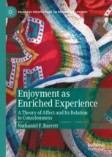Search
Search Results
-
In Defense of Introspective Affordances
Psychological and philosophical studies have extended J. J. Gibson’s notion of affordances. Affordances are possibilities for bodily action presented...
-
Husserlian horizons, cognitive affordances and motivating reasons for action
According to Husserl’s phenomenology, the intentional horizon is a general structure of experience. However, its characterisation beyond perceptual...
-
Illusionism about Phenomenal Consciousness: Explaining the Illusion
According to illusionism, phenomenal consciousness is an introspective illusion. The illusion problem (Frankish
2016 ) is to explain the cause of the... -
Experiential Knowledge Without Beliefs
Here the focus is on sensory knowledge that we gain not from the external senses but from the internal senses such as the kinesthetic ones. Just as I...
-
Existential selfhood in Merleau-Ponty’s Phenomenology of Perception
This paper provides an interpretation of the existential conception of selfhood that follows from Merleau-Ponty’s account of perception. On this...
-
Perceptual Motivation for Action
In this paper we focus on a kind of perceptual states that we call perceptual motivations, that is, perceptual experiences that plausibly motivate us...
-
Seeing What to Do: Embodied Instructive Representations in Vision
Most representationalist accounts of visual perception hold that visual representations are belief—or judgement-like sensory staates with...
-
Enacting Ought: Ethics, Anti-Racism, and Interactional Possibilities
Focusing on political and interpersonal conflict in the U.S., particularly racial conflict, but with an eye to similar conflicts throughout the...
-
Measuring up the World in Size and Distance Perception
An empirically based view of size and distance perceptual content and phenomenology is introduced, in which perceivers measure worldly size and...

-
Relief, time-bias, and the metaphysics of tense
Our emotional lives are full of temporal asymmetries. Salient among these is that we tend to feel differently about painful or unpleasant events...
-
Dreyfus is right: knowledge-that limits your skill
Skilful expertise is grounded in practical, performative knowledge-how, not in detached, spectatorial knowledge-that, and knowledge-how is embodied...
-
An ecological approach to disjunctivism
In this paper I claim that perceptual discriminatory skills rely on a suitable type of environment as an enabling condition for their exercise. This...
-
Varieties of Distancing Experience
The pandemic of COVID-19 has actualized the problem of body self-perception during lockdowns, social distancing and working from home. The aim of...
-
A co-citation analysis of cross-disciplinarity in the empirically-informed philosophy of mind
Empirically-informed philosophy of mind (EIPM) has become a dominant research style in the twenty-first century. EIPM relies on empirical results in...

-
Phenomenal transparency, cognitive extension, and predictive processing
I discuss Clark’s predictive processing/extended mind hybrid, diagnosing a problem: Clark’s hybrid suggests that, when we use them, we pay attention...
-
Theory-Theories
The theory-theory is introduced as the first answer to the question how mind reading works: We attribute beliefs, desires, emotions and other mental...
-
The Affective Continuum
In this chapter and the next, the argument moves from the exposition of the harmonic theory of affect toward its application to various kinds and...
-
Autism, epistemic injustice, and epistemic disablement: a relational account of epistemic agency
The contrast between third- and first-personal accounts of the experiences of autistic persons has much to teach us about epistemic injustice and...
-
Culpability, Control, and Brain-Computer Interfaces
When actions are mediated by means of a brain-computer interface, it seems that we cannot assess whether the user is culpable for the action without...
